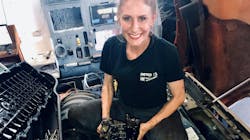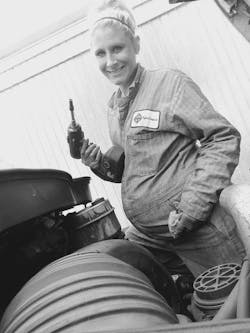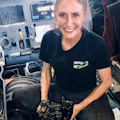I had no idea what I was getting myself in to when I started working on diesel trucks 20 years ago. A lifelong cheerleader with a slight frame, the odds were stacked against me. There weren’t any diesel programs in my local area of Chelmsford, Massachusetts, and while recent stats found women only comprise 2% of the technician workforce now, back then it felt more like 0.2%.
But I never let the odds stop me from pursuing what I knew I wanted to do. That passion started when my dad taught me that “preventive maintenance is key to longevity,” and carried on to high school, when I would work on friends’ cars. I even got a job at Jiffy Lube after graduation.
Then at age 21, there I was at WRJ Trucking Inc. and Jordan Equipment Inc. There, I learned the basics while repairing V8 mechanical Mack engines and started figuring out then-new Exhaust Gas Recirculation technology.
The importance and hazards of the job became more clear with my first wheel and rim replacement. We used Dayton wedge wheel rims and Budd wheels, where you back the lug off, but not all the way, leaving it still threaded on when hitting the rim to “pop” the wedges free. Under pressure, they pop off without the lug, which could injure or kill a tech. As I learned how dangerous this style wheel was from removal to installation, I flashed back to when I was a child and my mom would panic while driving behind or beside a tractor-trailer on our way up the coast to Maine. “The tires look like they’re going to fall off,” she’d say. I didn’t understand how real this fear could be then, but now I listened carefully as my mentor, William Jubinville Jr., explained how to line up and spin the tires to the sledgehammer and focus on the centrifugal evenness per wedge as each lug went on the wheel. From then on, I made sure every tire I touched was true and running straight down the road.
Even now I’m still learning, especially as emissions technology has become a bigger part of my job with the various EPA emissions regulations. With the introduction of aftertreatment systems, the days of a single ‘check engine’ light came to an end—replaced with indicators for DOC/DPF, DEF, and SCR, which all signaled new types of derate.
Now, I’m a senior lead master technician at a Taylor and Lloyd International dealership and things are changing even more with remote diagnostics and Navistar’s first engine without an EGR cooler since 2004, the S13 Integrated powertrain. But I’m just as dedicated to fixing trucks, learning, and keeping drivers safe now as I was then. And through it all, I know I’m doing what I was born to do.
Life as a female tech
As I continue to learn, I’ve also found a role in teaching, especially about how to include female technicians in the workforce. For the last four years, I have been diligently working as an International Trucks female technician ambassador in this effort for the International Trucks TECH EmPOWERment Program under Ana Salcido, technician recruitment manager for Navistar.
One major point is that we need more technicians. Many techs are aging out and recruitment and retention have become more imperative. But 50% of the workforce is not even being tapped into. Throughout the U.S., women have become more empowered since I started in the industry, but the shop environment has a ways to go. In some places, women are accepted and supported, though many others are still stagnant with old behavior and old ways of thinking.
Read more: Technician crushes common shop stereotypes
For example, I have never had a woman’s bathroom in a shop. In every shop I’ve ever worked at, I used the female customer or office bathroom—even through two full-term pregnancies. The owner of Taylor and Lloyd did offer to remodel the shop to include a women’s bathroom when I began my most recent dealership role, but I declined, as I didn’t want to be seen as getting special treatment. I was grateful just to be hired at all.
Do I regret not saying yes to the bathroom remodel? Yes, I do. But I have other more pressing things to advocate for. For example, I have been forced to wear men’s work clothes for 20 years, which isn’t just uncomfortable, but unsafe. With the standard unisex outfit—designed with men in mind—the pants crotch is loose and goes halfway to my knees. Every time I climb up the engine or go under vehicles, I’m constantly hiking my pants up to not trip or snag my clothing, which is extremely scary. And when using a creeper, the billowy clothing can catch under the casters, which is also not safe. We need more work pants available that are designed for a woman, by a woman. For me, I use a brand called Torq’d Clothing.
Additionally, I want to shed some light on being pregnant in the shop. I worked nonstop for all 40 weeks when I was pregnant, only slowing down due to some pretty severe morning sickness—which sometimes lasted all day. This had me throwing up off the side of engines for five months. But even then, pregnancy was never a limitation to my work. In fact, it expanded my abilities to look at challenges differently, making me a stronger technician. All I needed was some support from my shop, flexible start times to work around appointments, and a pregnancy plan in case of an emergency while at work. Maternity workwear would be nice, too, but I did appreciate the four months of maternity leave I received. My company also offered a room to pump breast milk in, but I declined.
Shops should also provide female techs with considerations in regard to women-specific issues such as endometriosis and menopause. I’m an advocate for programs that protect a woman for up to two days a month for medical incapacitation. Yes, it’s special treatment, but having come from a mother, as we all did, and now having all these first-hand experiences, I’ve learned it’s OK to accept special treatment sometimes with these circumstances.
I don’t bring all this up to complain but to help educate everyone to understand this topic with more compassion and empathy. Female technicians deserve respect, and they need more support through programs that cater to our differences. And we could all use more apprenticeships and mentorship so we can evolve with the future of maintenance and repair. The older technicians won’t be around forever, though I still do work next to a 75-year-old tech, Steve “Llama” Slamin.
And we need to ramp all this up now, as the female vehicle repair workforce is growing. According to the 2023 Women in Trucking Index, "more than 7% of technicians in companies in transportation are women." That’s a far higher percentage than the number of electric trucks out there, and the industry talks about that topic non-stop. Women have been in this profession for a long time, but sometimes it feels more like being tolerated than accepted. All we’re asking for is what any professional wants and deserves—to be treated fairly and respectfully, and to have the same opportunity and tools to evolve this industry into the next era of improving uptime. Remember that there’s one unisex thing we should all wear—pride in our industry and work. I wear mine on my sleeve. Guess it’s the cheerleader in me.
About the Author
Missy Albin
Missy Albin has been recognized by International Trucks as “one of the best technicians in the network” and is the OEM’s Female Technician Ambassador for the Tech EmPowerment recruitment program. She began working on diesel trucks in 2004 and joined International in 2009 at an IC dealership. While pregnant in 2017, Albin continued to work in the shop and even earned her Master Truck Certification during that time.


